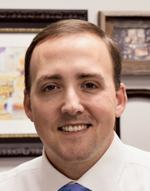
A caregiver at BrightStar Care consults with a client.
If the future of healthcare is in the home, as BrightStar Care CEO Shelly Sun believes, then the race is on for home health franchises to get their piece of a market made newly popular by the pandemic.
But adding skilled clinical services to companion and other non-medical care at home is complicated and expensive, especially for brands just beginning to wade in.
“The pandemic showed us how important it is to keep the most vulnerable safe at home,” Sun said, noting death rates from COVID-19 among elderly residents at skilled nursing facilities and other group settings. In March 2021, her franchise joined Moving Health Home, a new coalition aimed at changing federal and state policy to enable the home to be a clinical site of care. Home Instead and Right At Home, both home healthcare franchises, are also members of the new coalition along with non-franchise members.
“There were temporary changes made during the pandemic to allow what was termed hospitals without walls, to allow services to be reimbursed into the home. We want those expanded and we want those permanent,” Sun said. “We don’t want an institutional bias, where care is more highly reimbursed” by Medicare and other government funders in a hospital or a nursing facility.
Sun said BrightStar Care has offered skilled nursing services since its founding, in 2002.
BrightStar franchisees must have a full-time director of nursing on staff, which is why its investment range is $60,000 to $70,000 higher than competitors, she said, and they offer skilled care in all states where it’s allowed. “We’re in 39 states; 37 of our states are doing skilled. And our skilled portfolio is probably $250- to $300 million, out of $650 million” annual revenue.
She said franchises just starting to offer skilled nursing will have to make it optional for franchisees at first, since the service will not be in its franchise disclosure document. “Because it’s going to be voluntary, you might have your early adopters. But if they don’t have to, are they going to invest $80,000 to $100,000 for a clinical RN?” she said.
She also noted the “millions of dollars of investment in the technology” to enable and track compliance that goes along with government funding, “which might take four to six years for a payback. Most of my competitors are owned by private equity. I would argue…will you make those investments?” if an exit is on the horizon in five or so years.
“I think skilled is a difficult area to go into. I think it’s more aspirational than practical,” she said, referring to competitors who say they are going to add skilled services. “Most of them are five to 10 years off.”
Best Life buys clinical brand
At least three home healthcare franchises would argue differently. J.J. Sorrenti, CEO of Best Life Brands, just purchased PROHealth, a home health agency in Southern California founded by two nurses 20 years ago. He and the management team, backed by private equity firm The Riverside Co., are about to reveal a new name for the franchise along with a new FDD and roll out the franchise that will offer skilled nursing and occupational and speech therapy.
Best Life Brands offers companion care in the home through its ComForCare brand, “which we will still continue to grow,” Sorrenti said. “This will allow us to move into the Medicare space, and that is a big chunk of what goes on in this industry. It’s an $87 billion home care industry, and a lot of that is home care through Medicare.”
Care Patrol and Blue Moon Estate Sales are also under the Best Life umbrella. “There’s this increased consumerism that’s coming into healthcare as one generation moves into another,” he said, adding for his parents’ generation, “it was whatever the doctor said, and if it was painful that’s just the way it was.” Younger baby boomers, just beginning to make long-term care choices now, want to get care their way.

Namrata Yocom-Jan
Seniors Helping Seniors adds services
Seniors Helping Seniors President Namrata Yocom-Jan noted an increase in “people wanting to stay at home versus going to a nursing home,” she said, during the pandemic. “We’ve also seen an uptick” from franchisees. “People are recognizing this is a good industry to be part of. We’ve had seven new franchise owners that we’ve granted in the last three months,” which equates to 20 new territories.
A big draw has been new services at Seniors Helping Seniors: telecare, in which people can get services over the phone; and disease-specific services for such conditions as Parkinson’s and heart disease. Personal care services have expanded, too. “We’re able to help franchise partners accept more complicated cases, as well as help clients in dementia care. Seventy percent of our clients have some form of memory issue,” she said.
A final new offering is electronic wearables through a partnership with Electronic Caregivers. “A lot of times a family will say, you’re coming out Monday, Wednesday and Friday, but how do we make sure Mom is safe when you’re not there,” said COO Daniel Jan. “If they’re wearing a bracelet and they fall, we get notified right away. If they miss their medication, we get notified right away.”
The franchise is offering the device and app for free to clients who get more than 20 hours of service per week. “So they use it as a way to upsell clients who are close to the 20 hours,” he said.

Logan Davis
New backer for Vital Care
Vital Care Infusion Services has been offering infusion of IV medication in the home since the mid-1980s, through a bricks-and-mortar pharmacy plus contracted medicine courier service and contracted nursing services.
“We’ve always been a champion of in-home services, and as we went through the pandemic last year, that was an opportunity to raise awareness of our services,” said Logan Davis, head of franchise development. Otherwise patients had to go to a hospital outpatient center or a doctor’s office “sometimes every day, sometimes multiple times a day to get infusions. We’ve seen health insurers pushing out infusion therapy to in the home. They pay so much more to get those therapies done in a hospital outpatient” setting.
Linden Capital Partners acquired Vital Care from founder Johnny Bell in October 2020, and is pushing franchise growth. “We’ve been averaging three to five new franchisees per year for the last three or so years,” he said. “As we turn the page into 2021, our intention is to sign 20 franchise agreements this year, and then to grow further.” Vital Care has 63 units opened in 22 states. Investment cost ranges from $500,000 to $750,000.
“Overall, care is moving into the home anywhere it can, so it makes sense that homecare franchisors are beefing up their clinical offerings,” he said. “Everyone’s wanting to merge into the path of all this activity in healthcare, making services available in the home.”
"care" - Google News
July 28, 2021 at 07:13PM
https://ift.tt/3i6E85s
Healthcare Franchises Race to Boost Home Care | Franchise Focus | franchisetimes.com - Franchise Times
"care" - Google News
https://ift.tt/2N6arSB
Shoes Man Tutorial
Pos News Update
Meme Update
Korean Entertainment News
Japan News Update
Bagikan Berita Ini














0 Response to "Healthcare Franchises Race to Boost Home Care | Franchise Focus | franchisetimes.com - Franchise Times"
Post a Comment